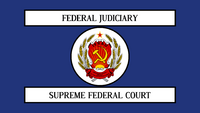Chief Justice of the Arstotzkan Union
| Chief Justice of Arstotzkan Union | |
|---|---|
 Flag of the Supreme Federal Court | |
| Supreme Federal Court of the Arstotzkan Union | |
| Style | Comrade Chief Justice (Formal) Your Honour (Within Court) |
| Abbreviation | CJ |
| Member of | Federal Judiciary Federal Judicial Council Arstotzkan Executive War Council Executive Committee |
| Reports to | Federal Judicial Council Executive Committee |
| Seat | Supreme Federal Court Office, Unitya, Rangitaiki, Arstotzkan Union |
| Appointer | First President of the Arstotzkan Union [a] |
| Term length | For-Life |
| Constituting instrument | Constitution of the Arstotzkan Union Government Procedures Act 2023 |
| Precursor | Head Judge of the Arstotzkan National Court |
| Formation | 26 November 2020 |
| First holder | Ethan Brinkman |
| Deputy | Attorney-General of the Arstotzkan Union |
The Chief Justice of the Arstotzkan Union is the chief judge of the Supreme Federal Court of the Arstotzkan Union and is the highest ranking member of the Federal judiciary of the Arstotzkan Union. The office of the Chief Justice was created officially on 26 November 2020 following the creation of the Supreme Federal Court from the Arstotzkan National Court, which for most of the history of the Arstotzkan Union up until then was the only part of the judicial body of the Arstotzkan Federal Government and other previous governments.
The Chief Justice has significant influence in the selection of cases for review, presides when oral arguments are held, and leads the discussion of cases with the other Justice. Additionally, when the court renders an opinion, the chief justice, if in the majority, chooses who writes the court's opinion; however, when deciding a case, the chief justice's vote counts no more than that of any other justice.
Outside the Supreme Federal Court, the Chief Justice acts as the chief administrative officer for the lower appellate courts. The Chief Justice also administers justice in the Federal Court of Appeals (along with the President of the Federal Court of Appeals) and the Federal Executive Court (along with the President of the Federal Executive Court) and advises the Federal Judicial Council on matters regarding function of the four circuits.
Roles
As Chief Justice, they have a lot of roles in the federal judiciary. Some of these include:
- Heading the Supreme Federal Court
- Acting as the head of the Federal Court of Appeals and Federal Executive Court along with their respective presidents
- Advises fellow judges on judicial matters and offers support to lower appellate judges with cases brought to the Federal Judicial Council.
- Appoints Federal Judges to the four Federal District Circuit Courts.
Chief Justices
Since the creation of the judiciary, only one person has served as the Chief Justice:
| Name | Date Confirmed | Tenure | Tenure Length | Appointed by | Court |
|---|---|---|---|---|---|
| Head Judge of the Arstotzkan National Court | |||||
| Ethan Brinkman | 25 August 2019 | 25 August 2019 -
26 November 2020 |
1 year, 64 days | National Assembly of the Arstotzkan Union | Arstotzkan National Court |
| Chief Justice of the Arstotzkan Union | |||||
| Ethan Brinkman | 26 November 2020 | 26 November 2020 -
Present day |
3 years, 360 days | National Assembly of the Arstotzkan Union | Supreme Federal Court |
Cases heard
Since the judicial body was the most inactive for much of the Arstotzkan Union's history, the Chief Justice has not heard many cases. However there have been more in recent years.
- Confederacy v. Arstotzkan Union (2022) - Chief Justice Ethan Brinkman ruled in favour of the plaintiff and banned discriminatory laws from being made.
- Arstotzkan Union v. Bendolf (2023) - Court ruled that the Empire of the Benereich King Bendolf breached Arstotzkan Law while in the country.
- Richardson v. Attorney General (2024) - Currently before the court. Arguing whether the Arstotzkan Union is sovereign in its legal system.
See also
- Attorney-General of the Arstotzkan Union
- President of the Federal Court of Appeals
- Federal Executive Court of the Arstotzkan Union
References
Footnotes
- ↑ On the advice of the Federal Judicial Council and the Executive Committee.
